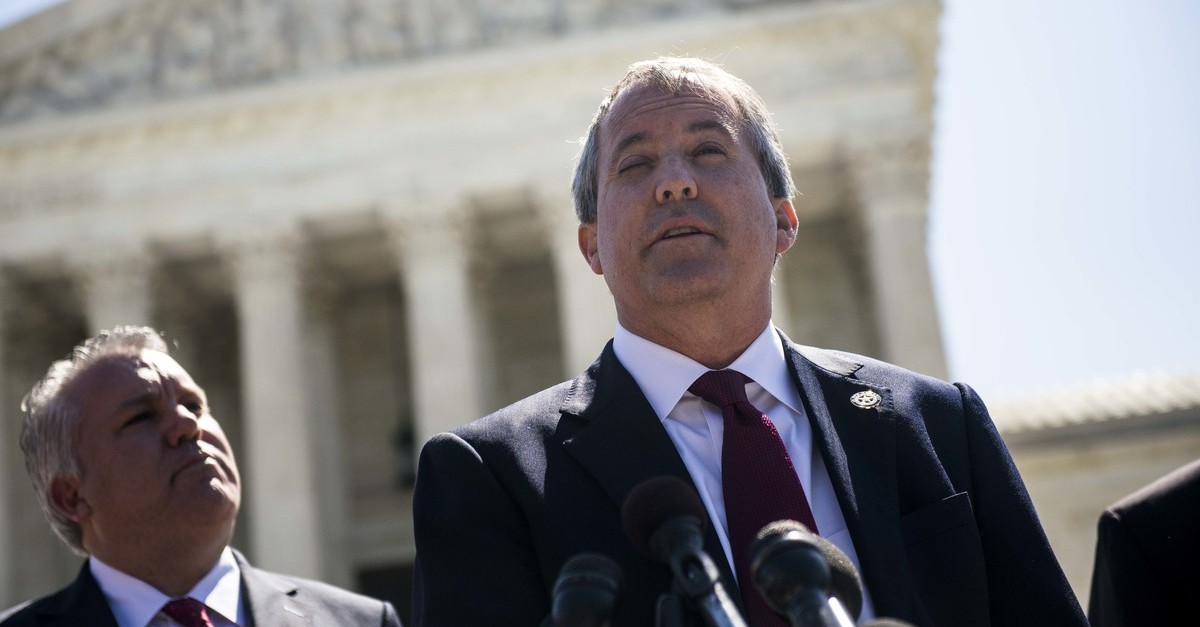
Texas Attorney General Ken Paxton argued against the expansion of vote-by-mail due to the novel Coronavirus (COVID-19) pandemic in a filing submitted with a state court of appeals on Monday.
A district court in the City of Austin previously ruled in favor of expanded postal voting by interpreting a section of the Texas Election Code which allows residents to cast ballots by mail if they have “a sickness or physical condition that prevents the voter from appearing at the polling place on election day.”
Paxton’s 75-page reply brief filed with the Court of Appeals for the Fourteenth Judicial District in Houston accuses the Travis County District Court of a “faulty reading of [the] statute” in question and said the case implicates fundamental separation of powers issues regarding the administration of voting laws in the Lone Star State.
“The [lower court’s] order is entirely untethered to the language passed by the Legislature,” Paxton’s filing reads. “It is unbounded in time or location. It eschews the deference due to the political branches in this type of crisis. And it cannot be allowed to stand.”
Litigation in the case began when a group of individual voters sued the Travis County Clerk and the Texas Secretary of State–who was quickly removed from the lawsuit–seeking a declaration that interpreted the relevant provision of the Texas Election Code. Those plaintiffs claimed that all Texas voters have a sickness or physical condition that prevents them from accessing polling locations during the 2020 general election due to the ongoing pandemic.
The State of Texas intervened by way of Paxton’s office and the plaintiffs were eventually joined by five Democratic Party-affiliated organizations. After a hearing on the original request for a temporary injunction, the plaintiffs asked for the injunction to apply to the entire state. The trial court ruled against the State of Texas and also prohibited several state actors from enforcing the Texas Election Code in any way that would deny the provision of a mail-ballot to any voter who fears contracting the deadly contagion.
Per the district court, Texas officials are prohibited from “issuing guidance or otherwise taking actions during all elections affected by the COVID-19 pandemic that would prohibit individuals from submitting ballots based on the disability category of eligibility.”
In other words, the Texas Republican Party’s own-goal efforts to keep liberal Austin voters from using mail-in ballots effectively resulted in making the franchise available to all Texans by mail–at least for now. Paxton’s reply brief fumes about that particular turn of events.
“The district court used the State’s intervention to justify an order that is remarkable in its overreach,” the reply brief complains.
The focus of Paxton’s legal argument against the injunction itself is that the plaintiffs lack standing to sue for the injury at issue.
“Individual Plaintiffs’ claim is based on a risk of contagion that is shared by every voter in the State,” the filing reads. “Such a theory violates the first rule of standing: that the plaintiff ‘must be personally aggrieved’ by an alleged wrongful act in order to seek a remedy through the courts.”
Rather than trying to exact political victories by way of a friendly court in Austin, Paxton says, such decisions must be left to the elected officials in the state–all of whom oppose the expansion of vote-by-mail over pandemic concerns or otherwise.
“Plaintiffs have not shown that their desire to vote by mail injures them in a way that is distinct from the general voting public,” the filing continues–arguing that no constitutional right is even implicated in the lawsuit. “In this case, the alleged harm is not any potential loss of the right to vote, but the inability to vote by mail.”
“[T]hough the Constitution protects a fundamental right to vote, that right does not encompass a right to vote by mail,” the attorney general argues later on. “As there is no constitutional right to vote by mail, it is available only on the terms the Legislature provides.”
Paxton also says there isn’t even an actual defendant in the original case because the Travis County official originally sued by the plaintiffs more or less acquiesced to their interpretation of the Texas Election Code.
“[T]he Travis County Clerk demonstrated at the hearing that she does not actually disagree with [the voters] and that she has taken no action to deprive them of their alleged rights,” the filing notes. “Indeed, the general agreement between [the voters] and the Travis County Clerk suggests that this case should have been dismissed under the general rule against collusive litigation. So any harm that [the voters] theoretically may face is not caused by the Travis County Clerk.”
The brief also addresses the terms in the election code:
An otherwise healthy person does not have a “sickness or physical condition” within the meaning of section 82.002 merely because he subjectively fears contracting COVID-19…The common understanding of “sickness” is the “state of being ill” or having “a particular type of illness or disease.” A person ill with COVID-19 would certainly qualify as having a sickness. However, a fear of contracting a sickness does not fall within the terms selected by the Legislature—namely, that a voter “has a sickness.”
“[T]o the extent that a fear of contracting COVID-19, without more, could be described as a ‘condition,’ it is a mental or emotional condition, not a physical condition as required by the Election Code,” the filing goes on. “The distinction between sickness and condition is significant: The Legislature used no modifier for ‘sickness,’ allowing a qualified voter with mental illness to vote by mail. By contrast, it limited the term ‘condition’ to ‘physical condition.'”
Paxton’s enmity for vote-by-mail is a matter of public record. In mid-April, the Texas attorney general threatened third-party voting rights advocacy groups with felonies for pushing increased access to vote-by-mail.
Read the full brief below:
Texas Reply Brief in COVID-… by Law&Crime on Scribd
[image via Gabriella Demczuk/Getty Images]